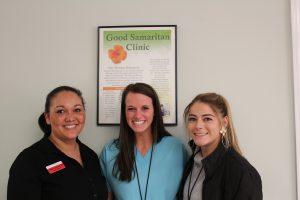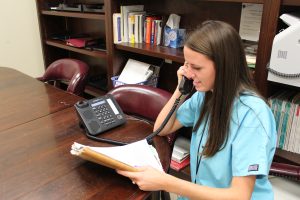
From the June 2019 Desktop News | Being a non-English speaker in West Alabama can make even simple tasks, such as going to the doctor, problematic. Eleven percent of patients at the Good Samaritan Clinic Northport are Hispanic or Latino, and many of them are non-English speakers. Yet the clinic does not have the resources to hire translators. Without them, doctors are unable to communicate with patients about symptoms or treatment.
Dr. Shirin K. Posner, UA Spanish instructor and director of Spanish Outreach, says she saw the need in her community and realized she had an opportunity to address it.
“A lot of our Spanish students are pre-med,” Posner said.
Posner created SP 362 Spanish for Health Care Professionals. This course gives students who plan to enter the medical field a way to combine their Spanish and health care knowledge while providing valuable services to the West Alabama community.
Each semester, approximately 32 UA students enroll in SP 362 Spanish for Health Care Professionals and volunteer at Tuscaloosa-area health clinics, primarily the Maude L. Whatley Health Center and the Good Samaritan Clinic. Both provide healthcare services to the medically underserved. Most patients are uninsured and have low incomes.
Elizabeth Rogers, a senior from Jacksonville, Florida, majoring in nutrition and minoring in Spanish, says she was humbled by the response to her work.
“The staff is so appreciative because they wouldn’t have been able to translate themselves,” Rogers said of her time at the Good Samaritan Clinic.
Mackenzie Senogles, a senior from Wisconsin majoring in biology and Spanish, says translating at the Maude L. Whatley Health Center opened her eyes to the importance of being bilingual.
“Before SP 362, I really didn’t realize how large of an impact this is on the community,” Senogles said. “It’s made me feel that I can do something to help.”
Lynn Amour, director of the Good Samaritan Clinic, says the benefits of her organization’s partnership with UA are reciprocal.
“The experience the University students have in this medical setting is invaluable, and what they offer us is invaluable as well,” Amour said.

Posner says Spanish for Health Care Professionals helps students understand Hispanic culture by dealing with it in person” The students’ volunteer work also allows them to practice and improve their Spanish.
In the classroom, Posner teaches Spanish vocabulary words pertaining to health care and facilitates simulated patient conversations. Students are tested on the material they learn in class and complete reflection papers after shifts at health clinics. As a final project, each student researches a medical issue and turns in a report written in Spanish.
Rogers intends to become a nutritionist and work with Spanish-speaking populations.
“Spanish for Health Care Professionals has inspired me to continue my Spanish education,” Rogers said. “Now I have a greater population to serve.”
Ron Nelson, a senior from Memphis, Tennessee, majoring in management information systems, plans to attend medical school and serve marginalized Hispanic populations – the latter due largely to his experience with SP 362.
“I was able to engage with a population that tends to be erased in this community,” Nelson said. “I personally feel called upon to dedicate my life’s work to improving health outcomes experienced by racial, sexual, gender and linguistic minorities.”
Senogles says Spanish for Health Care Professionals changed her life. “By serving others, you can find yourself,” Senogles said.
To learn more about Spanish for Health Care Professionals, contact Dr. Shirin Posner at skposner@ua.edu or 205-348-5059.